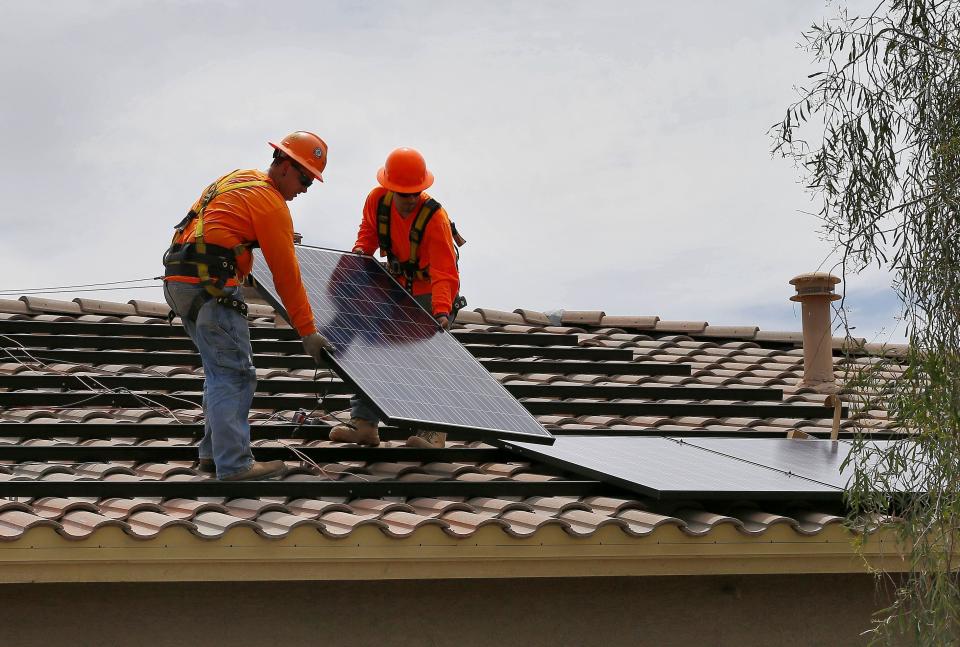Biden administration complains that China cheats us on solar, then lets them do it
- Oops!Something went wrong.Please try again later.
In announcing a two-year moratorium on additional tariffs on imported solar energy components, the Biden administration managed to highlight the incoherence of both its China policy and its energy policy.
China has been heavily subsidizing its solar component industry, principally panels. Compensatory U.S. tariffs date back to the Obama administration.
Domestic solar component manufacturers allege that Chinese firms are evading the tariffs by shipping finished components from Cambodia, Thailand, Vietnam and Malaysia, even though very little of the work is being done in those countries. The domestic manufacturers have asked that the tariff regime be extended to imports from those countries.
Utilities engaged in constructing utility-scale solar energy plants and rooftop solar installers oppose tariff expansion, since it increases their costs.
Stop relying on China, except for solar panels?
In late May, Secretary of State Anthony Blinken gave a speech purportedly providing the overall framework of the administration’s approach to China.
In it, Blinken said that the administration would “shape the strategic environment around Beijing to advance our vision for an open, inclusive international system.”
The means that Blinken outlined to accomplish that fell far short of anything likely to change China’s behavior or blunt its regional and international influence.
The U.S., Blinken said, would pursue its own industrial policy, particularly in the high tech field. We will enhance our cooperation with allies. And we will compete with China while working with it on things such as climate change.
We don’t want conflict or a new Cold War, Blinken averred. Nor do we seek economic disengagement.
There is nothing in all of that which would cause China to have second thoughts about what it is doing or have doubts about its prospects of altering international relations to its liking. Only serious economic disengagement might do that.
We say they're cheating, then let them do it

In his speech, Blinken explicitly cited solar panels as an example of China unfairly subsidizing exporters and of an unacceptable U.S. vulnerability to dependence on China imports.
Yet the Biden administration has just given a two-year green light to China evading the tariffs erected in an attempt to wean the U.S. off that dependency – a diplomatic wink and nod to China cheating. So much for upholding a rules-based international trading system.
The reason, presumably, was to give the domestic production of solar energy a boost.
The Biden administration is all in for a rapid transition to renewable energy sources. That’s reflected in the hostile regulatory environment it has established for fossil fuels, from canceling the Keystone pipeline, to slow-walking leases on federal lands, to appointing regulators who discourage investment in fossil fuel companies.
But it has run into practical and political issues. The current renewable energy load, because of its intermittency, creates reliability problems and threatens broad-scale rolling brownouts. High energy costs have created a political backlash.
Why are we so hostile to natural gas?
The Biden administration has encouraged other countries to increase their fossil fuel production. But has retained the hostile regulatory environment for domestic production.
It’s clear that continuing the transition to renewables requires an increased reliance on natural gas to provide reliable peak power. The U.S. should be expanding domestic production and use of natural gas.
Expanding U.S. natural gas exports would have geopolitical benefits, easing the dependence of other countries on troubling suppliers, such as Russia. But you can’t export what you don’t produce.
A similar myopia was recently displayed by the Arizona Corporation Commission, which has twice turned down a proposal by Salt River Project to expand peak power natural gas capacity in a location where it already has extensive production assets. That’s exactly the sort of additional capacity needed to maintain reliability while transitioning to renewable energy sources.
With respect to China, we need a firm disengagement policy. With respect to energy, we need a recognition of the importance of domestic natural gas to provide reliability while making the transition to renewable sources.
With the Biden administration, on both subjects, there’s not a firm policy in any direction.
Reach Robb at robert.robb@arizonarepublic.com.
This article originally appeared on Arizona Republic: Biden gave China the green light to cheat us on solar

